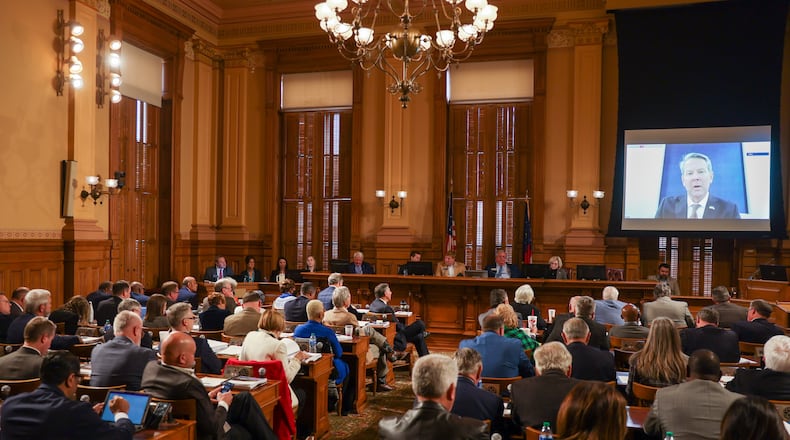A top state official pledged last week to end the practice of housing Georgia’s foster children in hotels, and said she would unveil proposals in coming days to achieve that end.
“Since joining this agency, we have been hellbent on ending ‘hoteling,’ a practice born out of necessity but one that contradicts our mission, crushes our workforce and derails life-saving work,” Candice Broce, commissioner for the Department of Human Services, said in testimony before state lawmakers. DHS oversees the Division of Family & Children Services or DFCS, an agency that is responsible for investigating child abuse, and finding homes for neglected children.
The practice of hoteling, or temporarily housing foster children in hotels, has persisted for years in Georgia and across the nation. But the trend was made worse by the pandemic and consequent staff shortages in child welfare industries.
Broce, in a presentation to the Joint Appropriations Committee, said her department will soon present legislation that was “carefully crafted” over months by a coalition of veteran Juvenile Court Judges, child welfare attorneys, and child welfare staff. The bills are backed by Gov. Brian Kemp, she said.
“This session we will offer legislation to fix statutory loopholes, ambiguous definitions and contradictory terms to better serve vulnerable families, keep more families safely intact and bolster our efforts to eliminate hoteling,” Broce said to lawmakers. “If we want to end hoteling in this state, we desperately need these changes in state law.”
Children who are placed in hotels, or even office spaces, have complex behavioral and mental health needs. Some of them have criminal backgrounds, making them very difficult to place in a foster home.
In 2016, DFCS officials pledged that they would end the use of hotels in Fulton and DeKalb counties in the next year. At the same time, state officials also agreed that no children would be allowed to spend more than 23 hours in a county DFCS office.
That didn’t happen.
The number of children in hotels has become much more pronounced since the start of the pandemic, according to Sally Buchanan, who heads a nonprofit that serves foster children with severe needs. The problem is multifaceted: there’s a lack of foster families available, many of whom stopped fostering as the coronavirus spread, and then never returned. Group homes and other childcare institutions have bled staff to better paying and less stressful jobs. This all means fewer placements for children.
To solve these problems, the state is going to have to make significant investments, she said.
“It’s going to take a lot to change,” said Buchanan, the CEO of Creative Community Services. “You’ve got to look at the long-term answer.”
Broce, the DHS commissioner, said that for the children with the most severe cases — including those who are suicidal, suffering from addiction, and sexually or physically aggressive — DFCS is “wholly unable to find an appropriately equipped foster family or group home for placement.” On any given night in Georgia, approximately 50 to 70 children in foster care with complex needs will sleep in a local office or hotel.
On Monday night, there were 63 children in hotels across the state, Broce said. In order to solve hoteling, Broce said the state must address the pipeline of children who should never have entered DFCS custody in the first place. She estimated that of those 63 children who were in hotels Monday night, one-third never should have even entered foster care.
DFCS spends an average of $1,500 dollars a night to hotel a foster child. This cost covers the child’s room, contracted behavioral aides for supervision, food and transportation and any property damage. In fiscal year 2022, DFCS spent $28 million in hoteling costs. In the 2023 fiscal year, which started in July, DFCS has already spent $15 million.
In late May, the state increased the daily per diem rates for private providers who take in children staying in offices or hotels. Those same providers also qualified for $5,000 incentives for each child they took in. In addition, the state took the drastic measure of paying a staffing company to provide staff for private providers.
By the summer, DeKalb and Fulton counties stopped using administrative offices to house children, according to a recent court monitor report that examines the two counties’ handling of foster care. But the use of hotels in those counties is now increasing, according to the report.
Between May and October of 2022, DeKalb County placed 14 children in hotels for a total of 134 days, according to the report. That’s compared to 49 youth placed in hotels by Fulton County, for a total of 733 days, over the same time period. There has been a great variation in the length of stays at hotels since August: some children stay just one or two days, while one child stayed for a total of 80 days.
Regardless, there is reason for optimism, so long as state officials are offering the right incentives to move children into better placements.
“Eventually the state can end its reliance on these inappropriate, non-child welfare placement settings,” the report says.
So far, Broce says the incentives are showing signs of working. For example, providers who take the extra funding are prohibited from ejecting that child for at least six months, absent extraordinary circumstances. This policy has yielded positive results, she said.
“Already we’ve seen far fewer placement disruptions, and thus more stability for the children,” Broce said.
About the Author
The Latest
Featured

